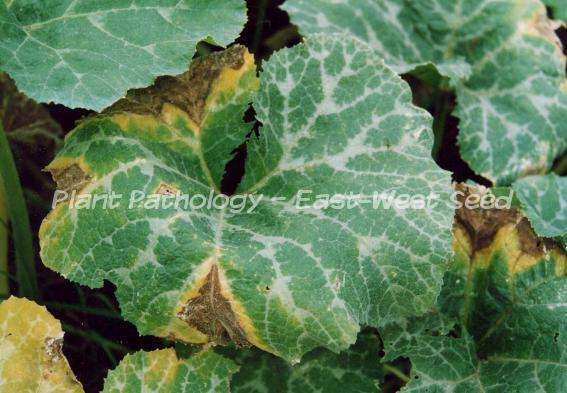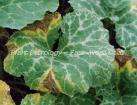Causal Agent:
Fungi (Phoma cucurbitacearum; Didymella bryoniae)
| Characteristic Symptoms: | |
 |
Leaf spots, mostly on leaf edges are light brown and expand to the center of the leaf usually forming a V- or U-shape lesion. |
 |
Stem lesions are light brown and often elongated and can be found at or near the stem base usually resulting from an expansion of a leaf infection. |
 |
Older leaves can become yellowish and die when the first fruit sets. |
 |
• Fruit infection usually starts from the blossom end. |
| Conditions for Disease Development: | |
 |
The pathogen survives between seasons on diseased vines and crop debris and may be seed-borne. |
 |
Moisture/high relative humidity is more important for disease development than temperature. |
 |
Cotyledons and young leaves of pumpkin are resistant but become susceptible as they mature. |
 |
The time between infection and symptom appearance is 3-7 days, in which large number of spores/conidia are produced. |
 |
Free moisture on leaves for 1 hr is necessary for infection and further continuous leaf wetness is required for lesion expansion. |
 |
Spores are disseminated by rain splashes or irrigation water. |
| Management and Control: | |
 |
Use resistant varieties, if available.
|
 |
Use pathogen-free seed.
|
 |
Avoid prolonged moisture to minimize severity. |
 |
Remove and destroy heavily infected leaves to minimize spread.
|
 |
Crop rotation for 2 years can help reduce inoculum in the soil.
|
 |
Spray/drench with chemical fungicides such as carbendazim ( (Bavistin 50 DFⓇ, Goldazim 500 SSⓇ, Minx 500 SCⓇ, SuperdazimⓇ, Avert 50 WPⓇ, BiostinⓇ), difenoconazole (e.g. ScoreⓇ, MontanaⓇ, PursueⓇ, BashⓇ), Difenoconazole+proficonazole (e.g. ArmureⓇ), Pyraclostrobin (e.g. Cabrio 25 ECⓇ) and metalaxyl+mancozeb (e.g. Ridomil Gold MZ 68 WGⓇ, Apron XL 350 ESⓇ) as early as symptoms are observed. |
To view other diseases, click here.
Need more help? Ask the Doctor.






